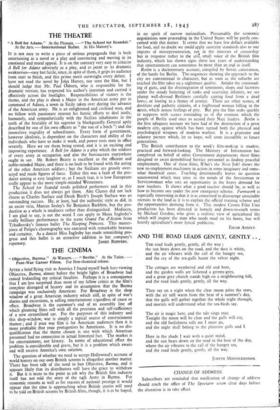THE THEATRE
" A Bell for Adano." At the Phoenix.—" The School for Scandal." At the Arts.—International Ballet. At His Majesty's.
IT is not easy to write a piece of serious propaganda that is both entertaining as a novel or a play and convincing and moving in its emotional and moral appeal. It is on the contrary very easy to criticise A Bell for Adano adversely as a play, and to point to its dramatic weaknesses—easy but futile, since, in spite of them, it grips its audience from start to finish, and this prime merit outweighs every defect. I have not read the novel by John Hersey, nor seen the film, but I should judge that Mr. Paul Osborn, who is responsible for the dramatic version, has respected his author's intention and carried it effectively across the footlights. Responsibilities of victory is the theme, and the play is about a Major in the American army put in command of Adano, a town in Sicily taken over during the advance of the American army. He is an enlightened and civilised man, and we follow with passionate interest his heroic efforts to deal justly, humanely, and sympathetically with the Sicilian inhabitants in the teeth of the brutality of his superior (a blackguardly ,General aptly described by one of his own officers as " the son of a bitch ") and the insensitive stupidity of subordinates. Every form of government, however idealistic, is dependent on the characters and ability of the individuals who have to make it work, and power tests men in office severely. Here we see them being tested, and it is an exciting and improving experience. A Bell for Adano is a play which the soldiers of every army in occupation and also the bureaucrats everywhere ought to see. Mr. Robert Beatty is excellent as the efficient and noble-minded Major, and there is no fault to be found with the acting of the other American soldiers ; but the Sicilians are grossly over- acted and made figures of farce. Either this was a fault of the pro- duCer aiming at easy laughter or, as I much fear, it is how Europeans really appear to the more simple-minded Westerners. The School for Scandal needs polished performers and in this production it does not always get them. Alec Clunes did not lack charm as Charles Surface and Derek Birch's Joseph Surface was an outstanding success. He, at least, had the authentic style as did, in an easier vein, Marcus Insley's Sir Benjamin Backbite, but the pro- duction as a whole is mediocre rather than distinguished. Mediocre, I am glad to say, is not the word I can apply to Mona Inglesby's really brilliant performance in the scene Grand Pas d'Action from Tchaikovsky's famous ballet The Sleeping Princess. This master- piece of Petipa's choreography was executed with remarkable bravura and certainty. As a dancer Miss Inglesby has made astonishing pro- gress and this ballet is an attractive addition to her company's


























 Previous page
Previous page